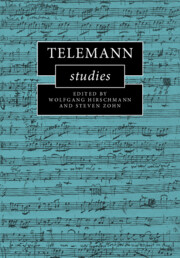Book contents
- Telemann Studies
- Cambridge Composer Studies
- Telemann Studies
- Copyright page
- Contents
- Figures
- Music Examples
- Tables
- Appendices
- Contributors
- Preface
- Abbreviations
- Part I Enlightenment Perspectives
- 1 Sehet an die Exempel der Alten
- 2 Composing “Freedom” and Freedom of the Composer
- 3 Telemann’s Beschreibung and Castel’s “Enlightenment” Harpsichord
- Part II Urban and Courtly Contexts
- Part III Nature (and) Theology in the Late Vocal Works
- Part IV Bach Family Connections
- Part V Cantata Cycles in Frankfurt, Hamburg, and Beyond
- Index of Telemann’s Works
- General Index
1 - Sehet an die Exempel der Alten
The Presence of the Past in Telemann’s Sacred Vocal Music
from Part I - Enlightenment Perspectives
Published online by Cambridge University Press: 14 July 2022
- Telemann Studies
- Cambridge Composer Studies
- Telemann Studies
- Copyright page
- Contents
- Figures
- Music Examples
- Tables
- Appendices
- Contributors
- Preface
- Abbreviations
- Part I Enlightenment Perspectives
- 1 Sehet an die Exempel der Alten
- 2 Composing “Freedom” and Freedom of the Composer
- 3 Telemann’s Beschreibung and Castel’s “Enlightenment” Harpsichord
- Part II Urban and Courtly Contexts
- Part III Nature (and) Theology in the Late Vocal Works
- Part IV Bach Family Connections
- Part V Cantata Cycles in Frankfurt, Hamburg, and Beyond
- Index of Telemann’s Works
- General Index
Summary
Telemann’s complex relationship with the musical past encompassed a healthy respect for the works of previous generations (Lully, Corelli, and others), ambivalence about “ancient” music that was marked by impoverished melodies and contrapuntal excesses, and disdain for Ancients who rejected whatever was new. This chapter addresses yet another perspective, of a composer at pains to bring outmoded musical idioms into a meaningful dialogue with more modern ones. Two works in particular, church cantatas that Telemann composed in Frankfurt am Main, demonstrate how such juxtapositions can serve as rhetorically powerful tools for communicating a theological message. Whereas Sehet an die Exempel der Alten (TVWV 1:1259) cleverly caricatures music of the mid-seventeenth century, the striking dialogue cantata Erhöre mich, wenn ich rufe (TVWV 1:459) casts a doubting, disconsolate Christian as a musical Ancient and the consoling Jesus as a Modern, an opposition vividly highlighted by text, musical style, and instrumentation. That Telemann’s reminiscences of the musical past are not cut of a purely nostalgic or ironic cloth but instead offer a productive dialogue with the musical present – one articulating an enlightened awareness of the divide between historical and present-day consciousnesses – may be read as evidence of the composer‘s extraordinary capacity for aesthetic and theological reflection.
- Type
- Chapter
- Information
- Telemann Studies , pp. 3 - 38Publisher: Cambridge University PressPrint publication year: 2022



